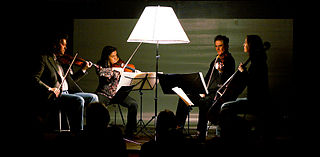Rosamunde is an 1823 play by Helmina von Chézy.
Rosamunde may also refer to:

Franz Peter Schubert was an Austrian composer of the late Classical and early Romantic eras. Despite his short life, Schubert left behind a vast oeuvre, including more than 600 secular vocal works, seven complete symphonies, sacred music, operas, incidental music, and a large body of piano and chamber music. His major works include "Erlkönig", the Piano Quintet in A major, D. 667 , the Symphony No. 8 in B minor, D. 759 , the "Great" Symphony No. 9 in C major, D. 944, the String Quintet, the three last piano sonatas, the opera Fierrabras, the incidental music to the play Rosamunde, and the song cycles Die schöne Müllerin and Winterreise.
Death and the Maiden, a concept ultimately derived from the Medieval "Dance of Death", may refer to:
The Takács Quartet is a string quartet founded in Budapest, Hungary, and now based in Boulder, Colorado, United States.
The Belcea Quartet is a string quartet, formed in 1994, under the leadership of violinist Corina Belcea.

The String Quartet No. 14 in D minor, D 810, known as Death and the Maiden, is a piece by Franz Schubert that has been called "one of the pillars of the chamber music repertoire". It was composed in 1824, after the composer suffered a serious illness and realized that he was dying. It is named for the theme of the second movement, which Schubert took from a song he wrote in 1817 of the same title.

The String Quartet No. 13 in A minor, D 804, Op. 29, was written by Franz Schubert between February and March 1824. It dates roughly to the same time as his monumental Death and the Maiden Quartet, emerging around three years after his previous attempt to write for the string quartet genre, the Quartettsatz, D 703, that he never finished.

The Quartettsatz c-Moll D 703 was composed by Franz Schubert in December 1820 as the first movement, Allegro assai, of a string quartet he was never to complete. Upon publication it was nonetheless listed as his "String Quartet No. 12". The nine-minute work is regarded as an early product of the composer's mature phase of output.
String Quartet No. 14 may refer to:

Rosamunde, Fürstin von Zypern is a play by Helmina von Chézy, which is primarily remembered for the incidental music which Franz Schubert composed for it. Music and play premiered in Vienna's Theater an der Wien on 20 December 1823.

The Rosamunde Quartett was a German string quartet ensemble formed in 1992 and dissolved in 2009. It was named after Franz Schubert's String Quartet No. 13 and the incidental music Rosamunde on which the slow movement of this piece is based. Its members consisted of Andreas Reiner (violin), Diane Pascal (violin), Helmut Nicolai (viola), and Anja Lechner (cello). Simon Fordham (violin) was also previously a member.
Quartettsatz can refer to these compositions:
Müller may refer to:
String Quartet No. 8 may refer to:
String Quartet No. 9 may refer to:
String Quartet No. 10 may refer to:
String Quartet No. 11 may refer to:
String Quartet No. 12 may refer to:
String Quartet No. 13 may refer to:
String Quartet No. 15 may refer to:
The Artemis Quartet is a German string quartet, founded in 1989 in Lübeck, and now based in Berlin. The quartet is named for the Greek goddess of hunting and the wilderness.